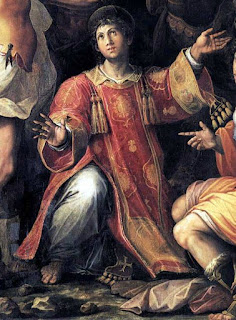A priest friend once told me, "There's no one deader than a dead priest." They have no descendants to pray for them and are soon forgotten. But the reality is that we are all "soon forgotten." I remember my grandparents on my dad's side, but I never knew my mom's adoptive parents and no one in our family knows anything at all about my mom's birth parents. My mom didn't even know she was adopted until after she was married.
The litany of humility reminds us of the sorrow of being forgotten and invites us to pray, "From the fear of being forgotten, deliver me, O Jesus." We all need deliverance from that fear, because we will all be forgotten. Oh, we may be remembered for a few generations, but after our grandchildren and, perhaps, our grandchildren are gone who will remember us?
The answer to that question is easy. God made us; we belong to Him. Even if a mother forgets the child in her womb, God remembers us and calls us every minute, ever second of every day. If He didn't remember us we would cease to exist.
I pray for my ancestors every morning, especially those who passed on the faith. I would not be here without them. I might not be a Catholic without them. Think of the importance of ancestors. Two of the synoptic gospel writers, Luke and Matthew, emphasized family history when they wrote their genealogies. The Old Testament is filled with genealogies: Adam and Eve, Noah's sons, Abraham. In many ways, Genesis is a record of family trees. And it doesn't end with Genesis. We see family ties discussed in the Books of Esther and Ruth. The history of the kingdoms of Israel and Judah also trace family lines. We heard about it last week in the O Antiphons, "O root of Jesse." And then there's the first book of Chronicles detailing genealogies for the first nine chapters. Oh my!
And so I pray for my ancestors: the good and holy members of the family tree as well as the black sheep. How can I not be grateful for all of them? I don't know why my grandparents gave my mom up for adoption. But I know they gave me my mom and I wouldn't be here without her. And that goes for every one of my ancestors going back all the way to Adam and Eve. Each of them is a link in the chain of life that brought me to today.
I can be grateful, even for the sin of Adam and Eve!
Are you scandalized? The Church calls their sin "Oh happy fault that gave us such a Savior!" Not one of our sins, faults or mistakes is irredeemable. They all become part of the tapestry God weaves in our lives with the beautiful colors of joy and the more somber tones of sorrow and sin. We will see that tapestry at our personal judgment shortly after we die. If we accept the sorrows and unite them to the cross, they will be the golden threads that turn the somber colors into glittering glory!
Today, after the joy and halleluja of Christmas, Holy Mother Church, in her wisdom, gives us the feast of the first martyr, St. Stephen. What an opportunity to think of our own daily invitation to martyrdom, not, most likely, a bloody martyrdom, but a white martyrdom. My sister always called it crucifixion by thumbtack. The humility prayer lists the opportunities we have to imitate Jesus by embracing the cross. To be unloved, dishonored, insulted, despised, rebuked, calumniated, wronged, suspected, forgotten, humiliated, ridiculed -- all these unite us to the cross of Christ. What a blessing if we can learn to embrace them and thank God for them.
May Jesus Christ be praised, now and forever!
St. Stephen, pray for us.



Praying FOR ancestors is leftover of Roman paganism of praying TO ancestors.
ReplyDeleteYou're obviously a Protestant who doesn't believe in praying for the dead. So any of your ancestors in Purgatory won't have you interceding for them. But I bet you ask your friends to pray for you on occasion. That's part of the inconsistency of Protestant belief. What's pagan and heartless is abandoning dead loved ones who may not yet be in heaven and are suffering in Purgatory.
ReplyDeleteNever forget to pray for priests, especially those who passed away:
ReplyDeletehttps://cureprayergroup.org/devotions.jsp
Prayer for Priests in Purgatory
My Jesus, by the sorrows Thou didst suffer in Thine Agony in the Garden, in Thy Scourging and Crowning with thorns, in the Way to Calvary, in Thy Crucifixion and Death, have mercy on the souls of priests in Purgatory, especially those most forgotten and who have no one else to pray for them. I wish to remember all those priests who ministered to me, the priests my heart has never forgotten, and for those that I no longer recall due to my frailty of memory. Do Thou deliver them from the dire torments they endure; call them and admit them to Thy most sweet embrace in Paradise.
Say one Our Father and one Hail Mary, then:
Eternal rest grant unto them, O Lord, and let perpetual light shine upon them!
Pope St. Pius X and Ven. Pope Pius XII, pray for us and especially for our priests. Amen